|
|
|
Sort Order |
|
|
|
Items / Page
|
|
|
|
|
|
|
| Srl | Item |
| 1 |
ID:
137506


|
|
|
|
|
| Summary/Abstract |
Of the various television documentaries dealing with British military operations in Helmand Province, among the most successful have been those fronted by TV actor Ross Kemp. This article examines the development, airing and reception of the first of these, Ross Kemp in Afghanistan. The aims of the filmmakers and the needs of the Ministry of Defence and British Army are examined, along with Kemp’s time as an embedded reporter with 1 Royal Anglians in 2007, and the responses of critics, soldiers and the viewing public to resulting the series, in an effort to discern why it worked for all concerned.
|
|
|
|
|
|
|
|
|
|
|
|
|
|
|
|
| 2 |
ID:
148944


|
|
|
|
|
| Summary/Abstract |
Pakistan's religious television programs have drawn significant attention in both academic and policy circles. However, there has been surprisingly little systematic analysis of their content and influence. This article shows that, although the televangelists featured on the Pakistani television channels present some of the most conservative views regarding the role of women and religious minorities in society and the role of Islam in governance, Pakistani television is an arena of contestation. The impact of the lively debates between televangelists on young viewers—over whom the ideological battles are being waged—is mixed. Findings from an original survey of Pakistani students and political activists suggest that young people in Pakistan watch religious shows only occasionally. Those that do, however, take them seriously. What leads young people to consume religion on television is a sense of social responsibility: that they are doing it not just for themselves, but also—and perhaps more importantly—for others, be it their families or communities.
|
|
|
|
|
|
|
|
|
|
|
|
|
|
|
|
| 3 |
ID:
093725
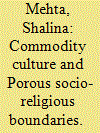

|
|
|
|
|
| Publication |
2010.
|
| Summary/Abstract |
Based on fieldwork, this article portrays the deep influence exercised by modern media on the women in a Muslim neighbourhood in Delhi during the past 30 years. While visual media consumption was earlier largely tabooed and restricted, today's consumers of media products appear significantly influenced by a media-driven com-modification of culture. The research findings indicate that a revision of 'traditional' assumptions about the lifestyles and thought patterns of Muslim women, at least in this particular neighbourhood in Delhi, is required to understand the current daily realities of Muslim women's lives in South Asia.
|
|
|
|
|
|
|
|
|
|
|
|
|
|
|
|
| 4 |
ID:
127946
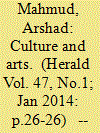

|
|
|
| 5 |
ID:
172365
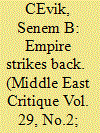

|
|
|
|
|
| Summary/Abstract |
Turkish drama series aired on state network TRT (Turkish Radio and Television) connect Ottoman history with contemporary events in Turkey and have been instrumental agents in the government’s attempts to shape the political reality in accordance with its political agenda. This article examines the narrative cultivated by the popular historical drama Payitaht: Abdülhamid (2017) by using the dramatistic process framework. In doing so, it analyzes the overlapping narrative of historical and contemporary in-groups and out-groups. Payitaht: Abdülhamid recreates the current political divides on screen in Turkey by assigning guilt and redeemer statuses to certain characters in the drama series and by providing a longitudinal perspective of Turkish history. Payitaht: Abdülhamid is, therefore, a political tool used by the ruling AKP (Adalet ve Kalkınma Partisi [Justice and Development Party]) government to cultivate and propagate a worldview that connects the Ottoman past to contemporary politics. Furthermore, Payitaht: Abdülhamid feeds the existent divisions within Turkey by reinforcing the AKP’s political discourse on key domestic and foreign policy issues and helps to push its agenda to the fore.
|
|
|
|
|
|
|
|
|
|
|
|
|
|
|
|
| 6 |
ID:
180059
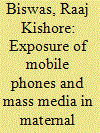

|
|
|
|
|
| Summary/Abstract |
Communications through mobile phones and mass media have shown to be useful for health promotion activities in developing nations. This study explored the potential association of mothers’ mobile phone ownership and mass media exposure on maternal health care services in a developing nation setting: urban Bangladesh. The Urban Health Survey 2013 was examined for antenatal care, delivery assistance, and postnatal care of both mothers and children through multiple regression models, adjusting for sociodemographic factors. Among 8987 ever-married female respondents, 64.1% owned mobile phones and 88% were exposed to mass media (TV, radio or newspaper) at least once a week. Mobile phone ownership was associated with a 48% greater likelihood of access to antenatal care, 34% greater delivery assistance and 31% greater postnatal care of the mother, but no differences were found for postnatal care of children. Similarly, frequent media exposure was associated with increased access to antenatal care (38%) and delivery assistance (46%), but not associated with postnatal care of mothers or children. The results suggested that mobile phones and mass media could be valid avenues for promoting access to maternal health services, and thus, support for mobile phone access and investment in awareness campaigns targeting relevant communities are worthwhile
|
|
|
|
|
|
|
|
|
|
|
|
|
|
|
|
| 7 |
ID:
126885
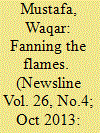

|
|
|
| 8 |
ID:
123923
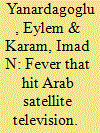

|
|
|
|
|
| Publication |
2013.
|
| Summary/Abstract |
Turkish television drama series were locally produced products until the early 2000s. Since then, about 70 different titles have been broadcast to audiences in 40 countries, especially in the Middle East, where they comprise approximately 60% of the share in foreign programme broadcasts. This article explores the factors that led to such an attraction by considering the debates around the impact of transnational media products on Arab cultural identity. The authors conducted focus groups and interviews with audiences in Palestine and Egypt and with the producers/distributors of these TV series in Turkey. The data presented here comprise the results of one of the first field-based studies on the reception of Turkish media products in the region. Foremost, the Arab audience response to these Turkish TV series highlights the differences in conceptualisations of 'modernity' in the Arab World. Moreover, the data suggest that audiences do not necessarily consider transnational media products as culprits that corrupt cultural identity.
|
|
|
|
|
|
|
|
|
|
|
|
|
|
|
|
| 9 |
ID:
079072
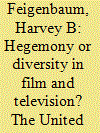

|
|
|
|
|
| Publication |
2007.
|
| Summary/Abstract |
In October 2005 UNESCO produced its Universal Declaration on Cultural Diversity. This was largely a response to the worries of countries, especially in Europe and not least of which France, which feared the damaging effects to their cultures if trade in entertainment products remained too one-sided. Generally the argument of this paper is that while initial tensions between the United States and Europe were motivated by the usual commercial concerns, Europeans were increasingly worried about the cultural impact of this commerce. The Japanese, however, have not been nearly so concerned as the Europeans about becoming 'Americanized'. This lack of tension between the United States and Japan in the area of film and television is due to several factors. First, there is a complementarity between American entertainment and the Japanese electronics industry. Second, the Japanese are major players in some aspects of the entertainment industry, most especially in the area of animation, and they are especially influential in Asia. Finally, issues of cultural conflict between the United States and Japan are simply less salient to Tokyo than those which characterize Japan's relations with its Asian neighbors
|
|
|
|
|
|
|
|
|
|
|
|
|
|
|
|
| 10 |
ID:
150900
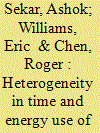

|
|
|
|
|
| Summary/Abstract |
There is substantial variability in residential energy use, partly driven by heterogeneous behavioral patterns. Time-use is relevant to energy when consumption tracks the time a device is used. Cluster analysis is a promising approach to identify time-use patterns. If clusters with particularly long time use and thus high energy consumption emerge, these groups could merit targeted policy intervention. We investigate these ideas via an empirical study of time use for television watching in the U.S. Three clusters were identified. In 2013, the average time spent watching television by Clusters 1, 2 and 3 are dramatically different: 1.1, 3.5 and 7.7 h per day respectively. While members of Cluster 3 are only 14% of the total population they represent 34% of TV energy consumption. The population of Cluster 3 tends to be older, less employed and less educated. Energy savings per adopter is much larger for Cluster 3, suggesting much higher benefits from efficient devices. These results are relevant to the design of efficiency programs, indicating potential for variable rebates and/or tiered communication. With variable rebates, utilities would offer higher incentives to high-use customers. In tiered communication, utilities would devote more resources to engage customers with larger savings potential.
|
|
|
|
|
|
|
|
|
|
|
|
|
|
|
|
| 11 |
ID:
166021
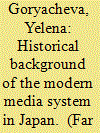

|
|
|
|
|
| Summary/Abstract |
This article surveys the historical background of the modern media system of Japan (television, radio, print media, news agencies), as well as the origins of interaction practices between the media and the government in the process of creating and broadcasting an information product. In addition, a brief overview of the main stages of the media system of Japan development is given, as well as an analysis of key factors that have influenced the process of the media sphere of Japan formation.
|
|
|
|
|
|
|
|
|
|
|
|
|
|
|
|
| 12 |
ID:
150410
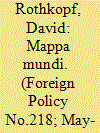

|
|
|
| 13 |
ID:
175799
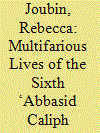

|
|
|
|
|
| Summary/Abstract |
A vast array of narratives found in medieval historical chronicles and literary sources have referenced the particular ways in which the culture associated with the ‘Abbasid caliphate diverged from a binary model of gender. Despite debate about the historical accuracy of these early chronicles, the repeated references to the sixth ‘Abbasid caliph Muhammad al-Amin's non-heteronormativity indicate at least a kernel of truth. This article examines the collective memory construction of al-Amin in the Egyptian series Harun al-Rashid (1997) and two Syrian series, Abna’ al-Rashid: al-Amin wa-l-Ma'mun (The Sons of al-Rashid: al-Amin and al-Ma'mun, 2006) and Harun al-Rashid (2018). These contemporary portrayals of the life of al-Amin simultaneously illustrate the process by which history is altered by authorial perspective and the erasure of nonheteronormative space within the ‘Abbasid caliphate. My own authorial perspective inclines toward an interpretation of al-Amin as queer; through this lens, an inspection of wide-ranging accounts of al-Amin's life reveals the historical biases of his time and our current moment, too, as historians then and now variably recognize al-Amin's queerness in constructing collective memory. Some have argued that anti–al-Amin chroniclers may have engaged in historical revisionism and referred to al-Amin as queer to discredit the caliph, but ultimately, whether or not this is true, the current application of those early references by contemporary screenwriters is the most revealing historiographical decision, as his many representations serve as a mirror for our contemporary subjectivities, interests, and agendas. At a time when queer lives and experiences are notably absent from traditional historical narratives, this article proposes that regardless of the accuracy of the original sources, the absence itself in contemporary portrayals is significant, as patterns of exclusion yield tangible meaning. In this particular case, the ready elimination of queerness from contemporary narratives shows the ways in which queerness is vulnerable to erasure in favor of other, more politically expedient identity characteristics and values.
|
|
|
|
|
|
|
|
|
|
|
|
|
|
|
|
| 14 |
ID:
114639
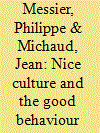

|
|
|
|
|
| Publication |
2012.
|
| Summary/Abstract |
In the northern highlands of Vietnam, a very specific official vision of culture is at the core of the modernisation projects of Vietnam Television VTV5 (Ðài Truy?n hình Vi?t Nam), a channel dedicated to educating ethnic minorities, and of the Lào Cai provincial branch of the Ministry of Culture, Sports and Tourism (MCST, B? Van hóa, Th? thao và Du l?ch). These two state institutions jointly organise film screenings - for instance condemning the production and consumption of opium and heroin - in remote villages where they intend to modify cultural practices. These state social actors also produce films that represent what are deemed exemplary minority traditions for public consumption. Our observations of these media processes lead us to suggest that the subjects of these exogenous initiatives are adjusting strategically, activating patterns of quiet resistance to maintain their identities and subvert marginalisation.
|
|
|
|
|
|
|
|
|
|
|
|
|
|
|
|
| 15 |
ID:
148295


|
|
|
|
|
| Summary/Abstract |
Sexual violence is prevalent as a plot device in Thai primetime television dramas, called lakhon. In the dramas, it is common for the hero to rape the heroine as part of a plot in which the two are fated to be together. The act of rape, and sexual violence more generally, is contextualized by narratives and ethical frameworks that make sexual violence comprehensible and legitimate. Gender violence is grounded in historical notions of sexual authority that deny female sexual agency. Thai lakhon, being the main form of televised domestic entertainment in Thailand, represent a critical element in the regulation of gendered forms of behavior and contribute to a culture in which women are subject to judgment and punishment.
|
|
|
|
|
|
|
|
|
|
|
|
|
|
|
|
| 16 |
ID:
178302


|
|
|
|
|
| Summary/Abstract |
This article offers a comparative overview of the representation of children and families in TV toy advertisements in Israel, Britain and Spain. It focuses on identifying the similarities and differences between the ads tasked with representing children in relation to specific products in different cultural environments. To a lesser extent, the article contributes, through its data, to exploring how advertisements adapt to each of the social and cultural realities in countries with different cultures.
|
|
|
|
|
|
|
|
|
|
|
|
|
|
|
|
| 17 |
ID:
094171
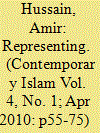

|
|
|
| 18 |
ID:
167080
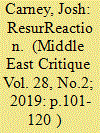

|
|
|
|
|
| Summary/Abstract |
The Turkish TV dramas Magnificent Century and Resurrection Ertuğrul share a number of traits: Both reprise the country’s Ottoman (or proto-Ottoman) past by focusing their story on a heroic figure; both raised the ire of critics for their lack of historicity; and both have been highly successful, ruling ratings on the same competitive Wednesday night prime time slot, with Resurrection coming in to take Century’s place after that show left the air. Despite these similarities, the projects represent quite different takes on the Ottoman past and the issue of history’s role in the Turkish present. While Century arguably partakes in what Svetlana Boym calls reflective nostalgia, Resurrection is a highly restorative project. In this article, I detail the differences between these projects and explain their success in light of the shifting political environment in Turkey. I begin with a characterization of Century and the ‘problem’ it posed for a conservative government that was deeply invested in an idealized Ottoman past. I next turn to Resurrection, which I see as a government reaction to Century, and explain that it succeeds where other imitators failed due to the careful choice of a hero with a relatively blank historical slate. Finally, I argue that Resurrection practices a different attitude toward history than does Century, heralding for a government that not only seeks to glorify and idolize the past, but also to claim ownership of it.
|
|
|
|
|
|
|
|
|
|
|
|
|
|
|
|
| 19 |
ID:
091468
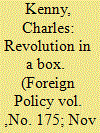

|
|
|
|
|
| Publication |
2009.
|
| Summary/Abstract |
It's not Twitter or facebook that's reinventing the planet. Eighty years after the first commercial broadcast crackled to life, television still rules our world. And let's hear it for the growing legions of couch potatoes: All those soap operas might be the ticket to a better future after all.
|
|
|
|
|
|
|
|
|
|
|
|
|
|
|
|
| 20 |
ID:
147007


|
|
|
|
|
| Summary/Abstract |
This article analyses the consumption of ‘telenovelas’ by Latin American residents in Spain. Our hypothesis is that ‘telenovelas’ are a way of constructing identities especially in communities that have emigrated to other countries and which can be seen in their specific viewing preferences for fiction. We have carried out a survey following the methodology applied in these kinds of studies. The survey was applied to 219 Latin American subjects who reside in Spain. We demonstrate that the main factors influencing the consumption of ‘telenovelas’ by the Latin American community residing in Spain are related to the cultural identities of the countries of production and which are represented in the context of the different storylines, such as natural locations, costumes and language. The results show that further research in this field is needed in order to identify the derivations of perceptions by the immigrant collectives through successful products such as ‘telenovelas’.
|
|
|
|
|
|
|
|
|
|
|
|
|
|
|
|
|
|
|
|
|